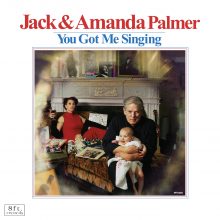In a year when crowdfunding grew exponentially across the globe, music projects accounted for thousands of campaigns, including a growing local trend towards fan-supported releases.
Record companies are out. Fans are in.
Or at least, that seems to be the latest online business model starting to take a hold within the music industry worldwide, with over 5,000 music projects being funded successfully by fans on Kickstarter alone.
Crowdfunding effectively involves a person or organisation pitching an idea or project, usually online, and then receiving pledges from people who want to back their project.
Depending on the model, the project may only be deemed to be successfully funded when a certain target is reached, at which point everyone’s pledges are processed (if the project fails to reach this target, the pledges are rescinded and no funding is received).
Most crowdfunding sites encourage the creation of rewards, or incentives that supporters receive for pledging different amounts. For a band that’s looking to fund an album, rewards might range from a digital download of the album when it’s finished, all the way up to having the band play at your next house party.
The biggest crowdfunding site at the moment is Kickstarter. With close to $320 million being pledged in 2012 and over 18,000 projects being successfully funded, it is quickly gaining an unbeatable lead – one might say an Amazonian lead – over its competitors.
Music dominated the number of projects on Kickstarter in 2012, with 5,067 music projects being successfully funded.
The most notable of these would have to be Amanda Palmer, who turned her goal of $100,000 into over $1 million dollars last year in what remains one of the most successful crowdfunding initiatives to date. Explaining in her pitch video that in the past, her record label would foot the $500,000+ bill for marketing and distribution of a global album release, she expressed the desire for the freedom to do it herself (and, in her words, “actually see a profit from my music”), with the support of her fans.
And support she received, much more so than even Amanda herself expected. The whole way Palmer ran her campaign, including the unique and varied rewards offered to supporters (that couldn’t be bought elsewhere) and her heart-felt and personal updates, has taught the music industry a lesson in what can be done and, perhaps, how to do it properly.
However, although pledges to Kickstarter projects came from 177 countries last year, those outside the US who wanted to start a campaign were limited with respect to currency options.
Enter Pozible, an Australian-based crowdfunding source that also saw much success in 2012, both locally and globally. Overall, over 1,900 projects were launched and $5.8M was pledged across 89 countries, with a 49% success rate.
Eskimo Joe recently launched a campaign to fund their new album (also after leaving their record label) and, with just under a month still on the clock, have already exceeded their target of $40,000.
This afternoon, Melbourne Cabaret venue The Butterfly Club announced that they had successfully funded their move from South Melbourne to a new CBD location, through a combination of crowdfunding and support from two arts foundations. The month-long campaign saw thousands of fans spread the word and hundreds more make pledges that allowed them to choose from a diverse range of exclusive experiences and kitsch items donated by the cabaret community.
Pozible is currently working with the Adelaide Fringe Festival to support their acts in getting ready for various shows and events in the lead up to next month’s launch. One of those acts, Melbourne-based duo Neon Bogart, are using the festival to launch their new EP, Split/Infinity, and have taken to Pozible to raise the funds to make it happen. Following Amanda Palmer’s lead, their rewards include unique gifts of jewellery and artwork, as well as a graphic novella set in “Cyberblanca”, which all ties into the futuristic theme of the project.
Other notable international crowdfunding sites include Indiegogo and PledgeMusic.
Indiegogo is tailored more specifically for creative and community based projects and does not have a minimum funding requirement, meaning that the project receives whatever is pledged by the end of the set time, no matter how large or small.
Even more specific in its target market, PlegeMusic is run by musicians, for musicians. Canadian rock band The Tea Party set up a campaign in the middle of last year and received 304% of their goal, allowing them to record and release their “Live In Australia” album worldwide.
With so many more musicians turning towards their fans and supporters, rather than record labels, for album and tour funding last year, it will be interesting to see what 2013 will bring. Will we see more million dollar campaigns for major artists, or will labels be forced to again reconsider what they can offer to entice musicians to save a piece of the pie for them?
Whatever the case, in a society that seemed to be getting used to getting everything online for free, the pendulum might finally be swinging back towards fans being keen to support their favourite musicians and artists to continue producing the work they love.



















